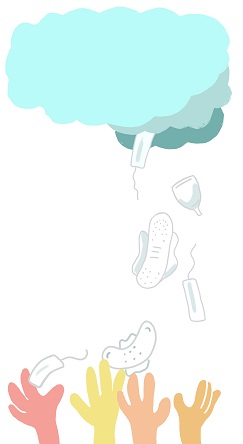Scottish Parliament passed a bill on March 3 that would provide free menstrual products to all. Scotland is the first country to pass a law mandating free menstrual products and is expected to be the first country to end “period poverty” according to The New York Times.
Previously, Scotland made menstrual products available to all students in high schools and universities and was the first country to do so in 2018.
Period poverty is defined as the choice many people who experience menstruation have between the cost of period products and other daily necessities. Lunette, a menstrual cup company, reported 1 million people cannot afford menstrual products.
In the United States, thousands of students lack the resources to manage basic menstrual hygiene and often see their education suffer as a consequence, as one in four teens have reported skipping school due to a lack of access to menstrual products, according to CNN.
Erica Bestpitch, director of Portland State’s Women’s Resource Center said Scotland’s passage of the law marks progress toward destigmatizing menstruation.
“It’s a move toward more equitable reproductive support, and I’m glad they are finding ways to implement a sustainable solution.”
Bestpitch also said that in some of the buildings at PSU, free menstrual products are provided in the restrooms, such as the Student Health and Counseling Center, along with the Women’s Resource Center and the Queer Resource Center.
Monica Lennon, the lawmaker who drafted the proposal of the bill, stated to The New York Times, “Individuals who have had their own lived experience of period poverty and know what it is like not to have access to products when they need them.”
The bill would provide tampons and sanitary pads at public places such as community centers, youth clubs and pharmacies, according to Reuters.
The bill passed through Scottish Parliament with 112 votes in favor, none against and one abstention. Despite the overwhelming support, some lawmakers warned the legislation that the bill may face some obstacles before officially becoming law, including the price tag of approximately $31 million per year.
“Period poverty is a very real challenge facing many girls in the UK,” said United Kingdom Campaign Manager at Plan International UK Lucy Russell, “and it’s devastating to hear of the impact it is having on girls’ lives, their ability to be themselves, and their self-esteem.”
According to the statistics by Plan International, a UK-based children’s charity, 10% of the female population have been unable to afford sanitary products, 15% have struggled to afford sanitary products and 14% have had to ask or borrow sanitary products from a friend due to affordability issues.
Mandu Reid, leader of the Women’s Equality Party, had the same view regarding period poverty and stigma in the U.K., according to The New York Times.
“Period poverty is an issue that affects women and girls across the UK, with more than a quarter having missed work or school because they couldn’t afford or didn’t have access to menstrual products.”
The New York Times also reported laws in several states in the U.S. now mandate access to menstrual products in correctional facilities, shelters, and schools. In the House of Representatives, Grace Meng, D–NY, has introduced two bills; one aims to make periods more affordable while the second aims to require manufacturers to disclose ingredients in their menstrual products.
According to NPR, although several states have tried to outlaw taxes on menstrual products, none have succeeded, despite items like chapstick, viagra and shampoo being exempt from sales tax.
Lawmakers hope that the passage of the Scottish Bill will help to destigmatize menstruation, a topic in which 48% of girls aged 14–21 in the UK are embarrassed to talk about, according to Plan International.
Member of Parliament Neil Findlay noted the “barrier of inability to discuss such serious issues about our health and well-being in the media or in public without embarrassment, reticence and discomfort.”
“Providing menstrual products is more of a reproductive justice and reproductive health issue than toilet paper rolls,” Bestpitch said.
On YouTube, celebrity Amber Rose starred in a “Period’s Equity” video to promote the destigmatizing of menstruation as well as bringing awareness to the tax. Rose is seen stroking a diamond pendant and opens the charm to reveal a single tampon.
“Where else would you keep something 36 states tax as a luxury?” she asked
Global Citizen reported menstrual health is not just a women’s issue globally; over 2.3 billion people live without basic sanitation services, especially in developing countries. The prevention of using facilities and resources that provide menstrual hygiene, affects those with special needs and disabilities, as well as those who live in conflict-affected areas or the aftermath of natural disasters, disproportionately.
